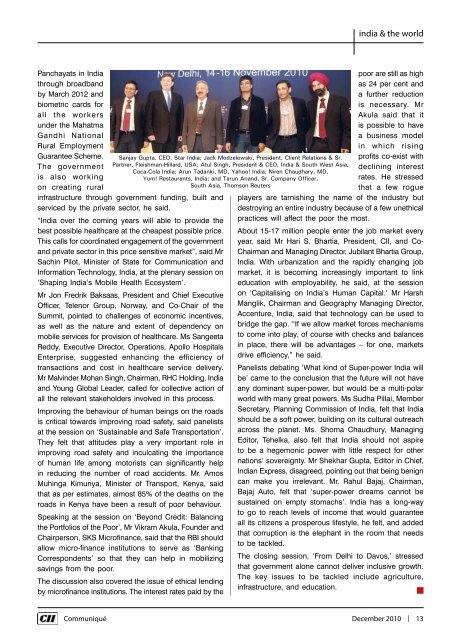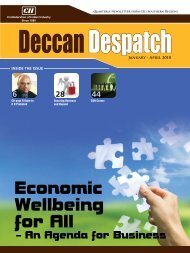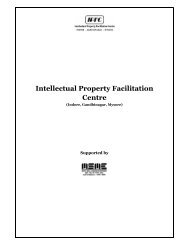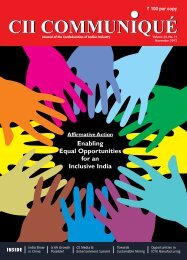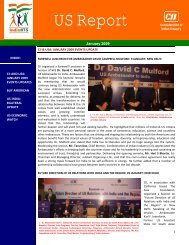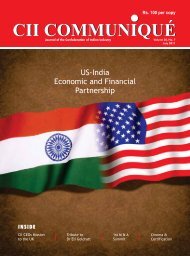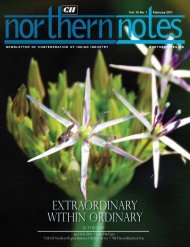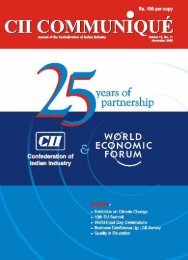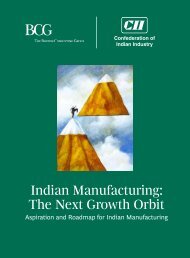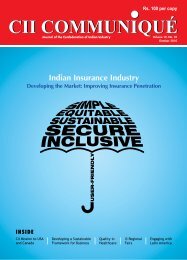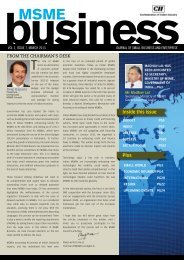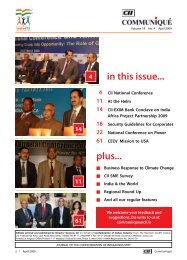CII Communique - December, 2010
CII Communique - December, 2010
CII Communique - December, 2010
You also want an ePaper? Increase the reach of your titles
YUMPU automatically turns print PDFs into web optimized ePapers that Google loves.
india & the world<br />
Panchayats in India<br />
through broadband<br />
by March 2012 and<br />
biometric cards for<br />
all the workers<br />
under the Mahatma<br />
Gandhi National<br />
Rural Employment<br />
Guarantee Scheme.<br />
The government<br />
is also working<br />
on creating rural<br />
infrastructure through government funding, built and<br />
serviced by the private sector, he said.<br />
“India over the coming years will able to provide the<br />
best possible healthcare at the cheapest possible price.<br />
This calls for coordinated engagement of the government<br />
and private sector in this price sensitive market”, said Mr<br />
Sachin Pilot, Minister of State for Communication and<br />
Information Technology, India, at the plenary session on<br />
‘Shaping India’s Mobile Health Ecosystem’.<br />
Mr Jon Fredrik Baksaas, President and Chief Executive<br />
Officer, Telenor Group, Norway, and Co-Chair of the<br />
Summit, pointed to challenges of economic incentives,<br />
as well as the nature and extent of dependency on<br />
mobile services for provision of healthcare. Ms Sangeeta<br />
Reddy, Executive Director, Operations, Apollo Hospitals<br />
Enterprise, suggested enhancing the efficiency of<br />
transactions and cost in healthcare service delivery.<br />
Mr Malvinder Mohan Singh, Chairman, RHC Holding, India<br />
and Young Global Leader, called for collective action of<br />
all the relevant stakeholders involved in this process.<br />
Improving the behaviour of human beings on the roads<br />
is critical towards improving road safety, said panelists<br />
at the session on ‘Sustainable and Safe Transportation’.<br />
They felt that attitudes play a very important role in<br />
improving road safety and inculcating the importance<br />
of human life among motorists can significantly help<br />
in reducing the number of road accidents. Mr. Amos<br />
Muhinga Kimunya, Minister of Transport, Kenya, said<br />
that as per estimates, almost 85% of the deaths on the<br />
roads in Kenya have been a result of poor behaviour.<br />
Speaking at the session on ‘Beyond Credit: Balancing<br />
the Portfolios of the Poor’, Mr Vikram Akula, Founder and<br />
Chairperson, SKS Microfinance, said that the RBI should<br />
allow micro-finance institutions to serve as ‘Banking<br />
Correspondents’ so that they can help in mobilizing<br />
savings from the poor.<br />
The discussion also covered the issue of ethical lending<br />
by microfinance institutions. The interest rates paid by the<br />
poor are still as high<br />
as 24 per cent and<br />
a further reduction<br />
is necessary. Mr<br />
Akula said that it<br />
is possible to have<br />
a business model<br />
in which rising<br />
profits co-exist with<br />
declining interest<br />
rates. He stressed<br />
that a few rogue<br />
players are tarnishing the name of the industry but<br />
destroying an entire industry because of a few unethical<br />
practices will affect the poor the most.<br />
Sanjay Gupta, CEO, Star India; Jack Modzelewski, President, Client Relations & Sr.<br />
Partner, Fleishman-Hillard, USA; Atul Singh, President & CEO, India & South West Asia,<br />
Coca-Cola India; Arun Tadanki, MD, Yahoo! India, Niren Chaudhary, MD,<br />
Yum! Restaurants, India; and Tarun Anand, Sr. Company Officer,<br />
South Asia, Thomson Reuters<br />
About 15-17 million people enter the job market every<br />
year, said Mr Hari S. Bhartia, President, <strong>CII</strong>, and Co-<br />
Chairman and Managing Director, Jubilant Bhartia Group,<br />
India. With urbanization and the rapidly changing job<br />
market, it is becoming increasingly important to link<br />
education with employability, he said, at the session<br />
on ‘Capitalising on India’s Human Capital.’ Mr Harsh<br />
Manglik, Chairman and Geography Managing Director,<br />
Accenture, India, said that technology can be used to<br />
bridge the gap. “If we allow market forces mechanisms<br />
to come into play, of course with checks and balances<br />
in place, there will be advantages – for one, markets<br />
drive efficiency,” he said.<br />
Panelists debating ‘What kind of Super-power India will<br />
be’ came to the conclusion that the future will not have<br />
any dominant super-power, but would be a multi-polar<br />
world with many great powers. Ms Sudha Pillai, Member<br />
Secretary, Planning Commission of India, felt that India<br />
should be a soft power, building on its cultural outreach<br />
across the planet. Ms. Shoma Chaudhury, Managing<br />
Editor, Tehelka, also felt that India should not aspire<br />
to be a hegemonic power with little respect for other<br />
nations’ sovereignty. Mr Shekhar Gupta, Editor in Chief,<br />
Indian Express, disagreed, pointing out that being benign<br />
can make you irrelevant. Mr. Rahul Bajaj, Chairman,<br />
Bajaj Auto, felt that ‘super-power dreams cannot be<br />
sustained on empty stomachs’. India has a long-way<br />
to go to reach levels of income that would guarantee<br />
all its citizens a prosperous lifestyle, he felt, and added<br />
that corruption is the elephant in the room that needs<br />
to be tackled.<br />
The closing session, ‘From Delhi to Davos,’ stressed<br />
that government alone cannot deliver inclusive growth.<br />
The key issues to be tackled include agriculture,<br />
infrastructure, and education.<br />
Communiqué <strong>December</strong> <strong>2010</strong> | 13


